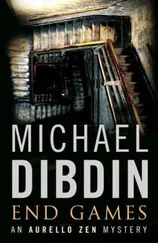Michael Dibdin - Cabal
Здесь есть возможность читать онлайн «Michael Dibdin - Cabal» весь текст электронной книги совершенно бесплатно (целиком полную версию без сокращений). В некоторых случаях можно слушать аудио, скачать через торрент в формате fb2 и присутствует краткое содержание. Жанр: Полицейский детектив, на английском языке. Описание произведения, (предисловие) а так же отзывы посетителей доступны на портале библиотеки ЛибКат.
- Название:Cabal
- Автор:
- Жанр:
- Год:неизвестен
- ISBN:нет данных
- Рейтинг книги:5 / 5. Голосов: 1
-
Избранное:Добавить в избранное
- Отзывы:
-
Ваша оценка:
- 100
- 1
- 2
- 3
- 4
- 5
Cabal: краткое содержание, описание и аннотация
Предлагаем к чтению аннотацию, описание, краткое содержание или предисловие (зависит от того, что написал сам автор книги «Cabal»). Если вы не нашли необходимую информацию о книге — напишите в комментариях, мы постараемся отыскать её.
Cabal — читать онлайн бесплатно полную книгу (весь текст) целиком
Ниже представлен текст книги, разбитый по страницам. Система сохранения места последней прочитанной страницы, позволяет с удобством читать онлайн бесплатно книгу «Cabal», без необходимости каждый раз заново искать на чём Вы остановились. Поставьте закладку, и сможете в любой момент перейти на страницу, на которой закончили чтение.
Интервал:
Закладка:
He opened the tool kit and selected a device like a pair of callipers, which he inserted into the upper lock. Zen had acquired the tools during the years he had spent in Naples. He had been directing a plan to bug the beachside villa of a prominent camorra boss when a burglar had broken into the property. He couldn’t arrest the intruder without compromising the original operation, but the burglar didn’t know that, and was delighted when Zen offered to drop all charges in return for the tool kit and a series of masterclasses in its use. It was some time since he had needed to put these skills to the test, but he was nevertheless surprised to find that the lock totally resisted all his efforts.
The lack of play in the lock was so marked that if the lower lock hadn’t had the key in it, he might have thought that the catch was snibbed back. But it had, and an unoccupied room couldn’t very well be locked from the inside. He stood listening to the hushing of the rain and staring at the stubborn door. Wrapping a handkerchief around the door handle, he shoved his shoulder hard against the edge, to see which lock gave. The next thing he knew, the door had swung effortlessly open, depositing him on his knees in the middle of the floor.
A dull prickle of apprehension ran over his scalp as he got up again. Surely Giovanni Grimaldi’s work could not have left him with such a rosy view of human nature that he went off to work leaving his belongings in an unlocked room in an unguarded building? The only possible answer seemed to be that he didn’t have any belongings, or at least none worth stealing. Apart from a few magazines, a small radio, a cheap alarm clock, some empty soft-drink bottles and the clothes hanging in the closet and laid out on the bed, the place looked as impersonal as a hotel room. The furniture must have been an eyesore even when new, which it hadn’t been for a very long time.
Zen looked around for somewhere to hide the plastic twine. The obvious candidate was the chest of drawers, a hideous monstrosity with bandy metal legs and a synthetic woodgrain top. The drawers were slightly open and the contents in disarray. Of course, men who live alone tend to be either obsessionally tidy or total slobs, and it might simply be that Grimaldi was one of the latter. Nevertheless, Zen once again felt the warning prickle.
On top of the chest of drawers lay a leather wallet, a bunch of keys, a red plastic diary, some loose change, an open letter and a framed photograph of a young woman holding two small children by the hand. A faded chrysanthemum lay on its side in front of the picture. Zen picked up the letter, from some relative in Bari, and skimmed through it. It was mostly about Grimaldi’s children, who were apparently well and ‘as happy as can be expected’, although they sometimes confused their mother’s absence with their father’s, thinking that he was in heaven and she in Rome. Zen put the letter down beside the flower of death. He stepped over to the window and looked down at the street below, sighing deeply as though gasping for breath. By the entrance to the pizzeria opposite a group of men were standing in the mild sunshine, arguing good-naturedly.
Zen whirled round as though someone had touched him. There was no one there. There was no one there. The unlocked door, the clothes laid out on the bed, the wallet and money and keys all ready, the drawers in disorder, the sound of rain while the sun shone… As if sleep-walking, Zen crossed the room and opened the door. Along the floor of the corridor, a long mobile tongue of dark liquid was making its slow way, curling this way and that across the red tiles. Zen set off towards the direction from which it was coming. At the end of the corridor was a door painted glossy white, with no number and no lock, just a semi-circular metal handle. The sound of falling water grew louder as Zen splashed his way towards it. Light streamed out of the cracks around the door on three sides, water on the fourth.
He rapped loudly on the white panelling. When there was no reply, he pulled and then pushed the door handle. The door rattled, but it was bolted on the inside. Zen stepped back, measuring his distance carefully. He bent his right leg and raised his foot to about the level of the internal bolt, then kicked out hard. The door burst inwards, but held.
‘Hey!’
A man had poked his head out of a doorway further along the corridor. Zen ignored him. He brought his leg up again and smashed his foot viciously at the door. This time the bolt gave way and the door sagged in. A wave of water poured down the steps into the corridor, creating a series of miniature waterfalls.
‘What the hell do you think you’re doing?’ the man demanded.
Zen didn’t even look round. He was staring at the water running down the white porcelain tiles of the floor, at the drenched dressing-gown which had for some time stemmed the flood under the door, at the eight-pointed cross roughly chalked on the wall, at the naked body slumped in the shower, blocking the drain, and at the face of Giovanni Grimaldi staring back at him, seemingly with an astonishment to match his own.
If the man had done as Zen had told him — phoned the police, and then waited outside for them to arrive — there would have been no problem. There was no phone in the building, so he had to go across the road to the pizzeria. That should have left plenty of time for Zen to subject Grimaldi’s room to a thorough search. As it was, he had barely started when he heard voices on the stairs. He hastily stuffed the red plastic diary into his pocket and regained the corridor just before the neighbour returned with a Carabinieri patrolman whose 850cc Moto-Guzzi had been parked outside the pizzeria while its driver demolished a piece of ham-and-mushroom within.
Apart from forcing him to curtail his search, this coincidence meant that Zen was cast in the role of Material Witness in the ensuing investigation, which went on for the rest of the afternoon. Faced with a couple of subordinates from his own force, he could have made a brief statement and then buggered off, but the paramilitary Carabinieri saw no reason to stretch the rules to accommodate some big shot from their despised civilian rivals. On the contrary! The inquiry into Giovanni Grimaldi’s death was handled strictly according to the letter of the law, with every t crossed, every i dotted, and every statement, submission and report written up in triplicate and then signed by the witnesses and counter-signed by the officials.
Not that there was the slightest doubt as to the cause of the tragedy. ‘I always said it was just a matter of time before something like this happened,’ the dead man’s neighbour told the patrolman as they gazed in through the open doorway of the shower. Marco Duranti was one of those florid, irascible men who have the answer to all the world’s problems. It’s all so very simple! The solution is right here, at their fingertips! Only — and this is what drives them mad — no one thinks to ask them. Not only that, but when they offer the information, as a disinterested gesture of goodwill, people take no notice! They even turn away, muttering ‘Give it a rest, Marco, for Christ’s sake!’ That’s what Grimaldi had done, the last time he’d warned him — purely out of the kindness of his own heart — about that damned shower. It was thus understandable that Duranti’s grief was tempered by a certain satisfaction that his oft-repeated warnings of disaster had been proved right.
He drew the attention of the Carabinieri patrolman to the electric water heater supplying the shower. Sellotaped to the wall near by was a piece of paper in a plastic cover punched for use in a folder. A faded message in red felt-pen indicated that the heater should always be turned off before using the shower. Now, however, the switch was clearly set to ON.
Читать дальшеИнтервал:
Закладка:
Похожие книги на «Cabal»
Представляем Вашему вниманию похожие книги на «Cabal» списком для выбора. Мы отобрали схожую по названию и смыслу литературу в надежде предоставить читателям больше вариантов отыскать новые, интересные, ещё непрочитанные произведения.
Обсуждение, отзывы о книге «Cabal» и просто собственные мнения читателей. Оставьте ваши комментарии, напишите, что Вы думаете о произведении, его смысле или главных героях. Укажите что конкретно понравилось, а что нет, и почему Вы так считаете.












